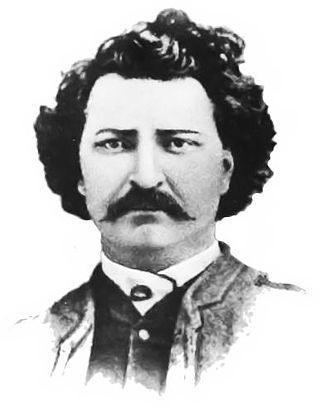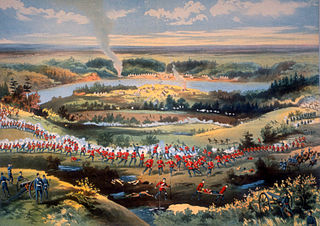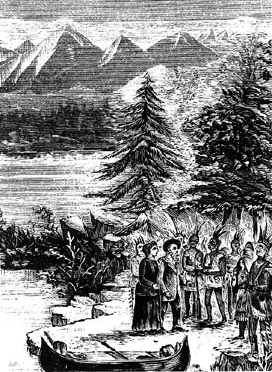Related Research Articles

Louis Riel was a Canadian politician, a founder of the province of Manitoba, and a political leader of the Métis people. He led two resistance movements against the Government of Canada and its first prime minister John A. Macdonald. Riel sought to defend Métis rights and identity as the Northwest Territories came progressively under the Canadian sphere of influence.

The North-West Rebellion, also known as the North-West Resistance, was an armed resistance movement by the Métis under Louis Riel and an associated uprising by Cree and Assiniboine of the District of Saskatchewan, North-West Territories, against the Canadian government. Many Métis felt that Canada was not protecting their rights, their land, and their survival as a distinct people. Fighting broke out in late March, and the conflict ended in June. About 91 people were killed in the fighting that occurred that spring before the conflict ended with the capture of Batoche in May 1885.

Irving Peter Layton, OC was a Romanian-born Canadian poet. He was known for his "tell it like it is" style which won him a wide following but also made him enemies. As T. Jacobs notes in his biography (2001), Layton fought Puritanism throughout his life:
Layton's work had provided the bolt of lightning that was needed to split open the thin skin of conservatism and complacency in the poetry scene of the preceding century, allowing modern poetry to expose previously unseen richness and depth.
Wilbert Colin Thatcher is a Canadian politician who was convicted for the murder of his ex-wife, JoAnn Wilson.

Wilbert Ross Thatcher, was a Canadian politician who served as the ninth premier of Saskatchewan from 1964 to 1971. Thatcher began his career as a member of the Co-operative Commonwealth Federation in 1942, elected first to Moose Jaw City Council and then in 1945 as a Member of Parliament representing Moose Jaw. In 1959, Thatcher made the switch both to Saskatchewan provincial politics and to the provincial Liberal Party, which he led through four provincial elections, winning majority governments in 1964 and 1967. Following his defeat in the 1971 provincial election, Thatcher retired from politics and died shortly afterwards.

Alfred Wellington Purdy was a 20th-century Canadian free verse poet. Purdy's writing career spanned fifty-six years. His works include thirty-nine books of poetry; a novel; two volumes of memoirs and four books of correspondence, in addition to his posthumous works. He has been called English Canada's "unofficial poet laureate" and "a national poet in a way that you only find occasionally in the life of a culture."

The Battle of Batoche was the decisive battle of the North-West Rebellion, which pitted the Canadian authorities against a force of First Nations and Métis people. Fought from May 9 to 12, 1885, at the ad hoc Provisional Government of Saskatchewan capital of Batoche, the greater numbers and superior firepower of General Frederick Middleton's force eventually overwhelmed the Métis fighters.

The trial of Louis Riel took place in Regina, Canada, in 1885. Louis Riel had been a leader of a resistance movement by the Métis and First Nations people of western Canada against the Government of Canada in what is now the province of Saskatchewan. Known as the North-West Rebellion, this resistance was suppressed by the Canadian military, which led to Riel's surrender and trial for treason. The trial, which took place in July 1885 and lasted five days, resulted in a guilty verdict. He was also given a choice to plead guilty or insanity. Riel was subsequently executed by hanging, an outcome which has had a lasting negative impact on relations between Anglophone Canadians and the Riel supporters among French Canadians.
Hilda Marion Ada Neatby was a Canadian historian and educator.

Marie-Anne Lagimodière was a French-Canadian woman noted as both the grandmother of Louis Riel, and as the first woman of European descent to travel to and settle in what is now Western Canada.
Gail Dianne Bowen is a Canadian playwright, writer of mystery novels and educator.
Exovedate is the name coined by Métis leader Louis Riel and given by him to his council of the Provisional Government of Saskatchewan during the North-West Rebellion in Canada. Ten years prior to this date on December 8, 1875 after attending a mass in Washington, D. C., Riel had a religious vision where God spoke to him in Latin. Riel believed that God had chosen him to be the divine leader of the Métis and that he had been given the mission to lead them to their promised land similar to how God had chosen Moses to lead the Jews. From this point onward Louis took the middle name "David" and called himself "the prophet of the new world."
Colin Malcolm McDougall (1917–1984) was a Canadian author best known for his 1958 Governor General's Award-winning novel Execution.
John Victor Maxwell Braithwaite was a Canadian novelist and non-fiction author. He was born in Nokomis, Saskatchewan and spent his youth in a number of communities in that province. As an adult he moved to Ontario, living in communities such as Orangeville, Port Carling and finally Brighton where he died at age 83.
Maria Campbell is a Métis author, playwright, broadcaster, filmmaker, and Elder. Campbell is a fluent speaker of four languages: Cree, Michif, Western Ojibwa, and English. Four of her published works have been published in eight countries and translated into four other languages. Campbell has had great influence in her community as she is very politically involved in activism and social movements. Campbell is well known for being the author of Halfbreed, a memoir describing her own experiences as a Métis woman in society and the difficulties she has faced, which are commonly faced by many other women both within and outside of her community.
Lyle Eldon Stewart was a Canadian provincial politician. A member of the Saskatchewan Party, he served six terms in the Legislative Assembly of Saskatchewan.

The 1961 New Democratic Party founding convention was held in Ottawa from July 31 to August 4 to elect a leader of the New Democratic Party (NDP) of Canada. This convention formally closed down the Co-operative Commonwealth Federation (CCF) party, the New Party clubs, and merged them with the Canadian Labour Congress (CLC) to form the NDP. It is also known for the divisive leadership vote in which Saskatchewan Premier Tommy Douglas was elected over national CCF leader Hazen Argue. Over 2000 delegates attended the five-day convention held at the Ottawa Coliseum.
The National Business Book Award is an award presented to Canadian business authors. The award, presented every year since 1985, is sponsored by Bennett Jones, The Globe and Mail, and The Walrus, DeGroote, and supported by CPA Canada and with prize management by Freedman & Associates.
Love and Hate: The Story of Colin and JoAnn Thatcher is a Canadian television miniseries, directed by Bruce Pittman and broadcast by CBC Television in 1989. Based on Maggie Siggins's 1985 book A Canadian Tragedy: JoAnn and Colin Thatcher: A Story of Love and Hate, the film dramatizes the story of Colin Thatcher, a former Canadian politician who was convicted in 1984 of the murder of his ex-wife JoAnn following their divorce.
References
- 1 2 3 4 Coward, Selina (13 March 1996). "94-67 Maggie Siggins" (PDF). University of Regina Archives and Special Collections The Dr John Archer Library. Retrieved 23 March 2013.
- ↑ Diane Smith, "The Thatcher murder: not just a family feud". The Globe and Mail , December 2, 1989.